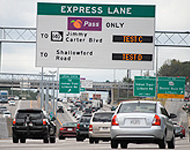Article from: www.thenewspaper.com/news/36/3616.asp
10/19/2011
Georgia HOT Lanes Create Congestion, Disappointment
Federally funded Georgia tolling project creates congestion so significant that governor intervenes.
 Georgia's introduction of high occupancy toll (HOT) lanes on Interstate 85 at the beginning of the month has already turned into a public relations disaster. During rush hour, motorists found themselves stranded in the general purpose lanes as the adjacent HOT lane -- constructed and maintained with their tax dollars -- were essentially unused. Drivers balked at paying the stiff $5.40 entrance tax for permission to enter, leaving the existing lane space to go to waste. Governor Nathan Deal (R) intervened swiftly on October 6 to order the State Road and Tollway Authority (SRTA) to lower the cost of using the toll lane.
Georgia's introduction of high occupancy toll (HOT) lanes on Interstate 85 at the beginning of the month has already turned into a public relations disaster. During rush hour, motorists found themselves stranded in the general purpose lanes as the adjacent HOT lane -- constructed and maintained with their tax dollars -- were essentially unused. Drivers balked at paying the stiff $5.40 entrance tax for permission to enter, leaving the existing lane space to go to waste. Governor Nathan Deal (R) intervened swiftly on October 6 to order the State Road and Tollway Authority (SRTA) to lower the cost of using the toll lane.
"Looking at what we've learned from our first four work days with the HOT lanes, I've asked SRTA to improve utilization of the express lanes," Deal said in a statement. "In the short term, the toll rate will lower -- starting with Thursday afternoon's commute -- but the effective rate will continue to change to regulate speed and volume."
The HOT lanes idea was hailed from the start as an important advance in the region's transportation network. Using $110 million in federal gas tax dollars, a system of gantries was set up requiring drivers to install an electronic transponder, called the Peach Pass, if they wished to pay to use a 15-mile stretch of the freeway that previously had been set aside as a high-occupancy vehicle (HOV), free for the use of anyone carrying an extra passenger in his vehicle. The change to the HOT format was hailed as a proven concept.
"The opening of the I-85 Express Lanes will represent a new era in transportation innovation," SRTA Executive Director Gena L. Evans, said on September 16.
After the project actually opened for business, motorist Howard Rodgers quickly racked up more than 1500 electronic and hardcopy signatures on a petition calling for a halt to the HOT lanes.
"By removing the existing HOV lane for use as a toll lane the state has created daily traffic jams and backlogs causing greater pollution, increased travel times, and an extra tax on the citizens of Gwinnett County and points north during times of economic decline," the petition states. "The adjustable toll system amounts to a monopoly on the travel lane requiring customer to pay a higher surcharge (price gouging) for the ability to arrive to or from work in a timely manner."
Deal forced state officials to ask the Federal Highway Administration for permission to allow vehicles with two, as opposed to three, people on board to use the express lanes for free. I-85 is not the only HOT lane to fail. In Washington State, the State Route 167 HOT lanes are on their third year in operation. According to the third-quarter financial results, it cost $173,939 more in toll collection expenses to operate the lanes than was generated in revenue in fiscal 2011.
 Georgia's introduction of high occupancy toll (HOT) lanes on Interstate 85 at the beginning of the month has already turned into a public relations disaster. During rush hour, motorists found themselves stranded in the general purpose lanes as the adjacent HOT lane -- constructed and maintained with their tax dollars -- were essentially unused. Drivers balked at paying the stiff $5.40 entrance tax for permission to enter, leaving the existing lane space to go to waste. Governor Nathan Deal (R) intervened swiftly on October 6 to order the State Road and Tollway Authority (SRTA) to lower the cost of using the toll lane.
Georgia's introduction of high occupancy toll (HOT) lanes on Interstate 85 at the beginning of the month has already turned into a public relations disaster. During rush hour, motorists found themselves stranded in the general purpose lanes as the adjacent HOT lane -- constructed and maintained with their tax dollars -- were essentially unused. Drivers balked at paying the stiff $5.40 entrance tax for permission to enter, leaving the existing lane space to go to waste. Governor Nathan Deal (R) intervened swiftly on October 6 to order the State Road and Tollway Authority (SRTA) to lower the cost of using the toll lane.